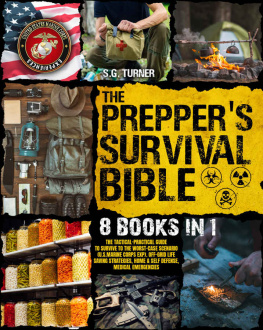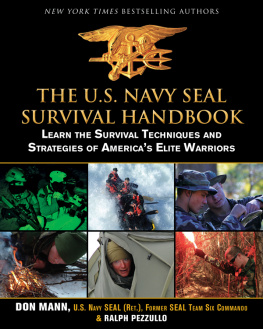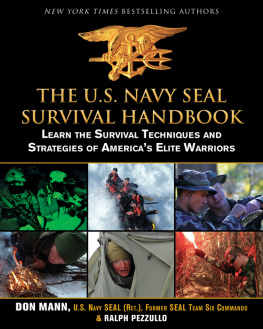The U.S. Navy SEAL
Guide to
The Elements
of survival
Learn the survival techniques and
strategies of americas
elite warriors
Don Mann
and Ralph Pezzullo
Skyhorse Publishing

The Survival Mind-Set
Why do some people with little or no survival training manage to prevail in life-threatening circumstances, while others with survival training die? The answer is mental fortitude, or the will to survive.
The key to survival is your mental attitude!
Psychology of Survival
Life-threatening situations create challenges that impact the mind. The thoughts and emotions that result can transform a confident, well-trained person into an indecisive, ineffective mass of neuroses and fears.
Obviously, none of us wants to fall apart when challenged. Thats why its imperative to familiarize yourself with the specific stresses associated with survivaland learn to understand and manage your own reactions to those stresses.
Stress
Whether we like it or not, stress is a condition that were all familiar with. Its basically our reaction to the pressures of living. It can be defined as a specific response of the body to a stimulus (such as pain) that interferes with the normal physiological equilibrium of an organism.
While stress is a condition most people seek to avoid, it also has benefits. For example, it provides a means of testing our strengths and values. It also helps us measure and develop our adaptability and flexibility. And, it can stimulate us to perform at higher levels.
Since we usually dont consider unimportant events to be stressful, stress can also be an excellent indicator of the significance we attach to a particular event. In other words, it tells us what we consider important.
All of us need some stress in our lives, but too much can be destructive. The goal, therefore, is to learn to manage stress so that it never becomes overwhelming. Too much stress leads to distress, which can adversely affect individuals and organizations.
Distress causes an uncomfortable condition that we try to escape and, preferably, avoid. Listed below are some common indicators of stress becoming distress:
Difficulty making decisions
Angry outbursts
Forgetfulness
Low energy levels
Constant worrying
Propensity for mistakes
Thoughts about death or suicide
Trouble getting along with others
Withdrawing from others
Hiding from responsibilities
Carelessness
Stress can be constructive or destructive. It can encourage or discourage, move us forward or stop us dead in our tracks. It can fill life with added meaning or render it meaningless. Stress can inspire us to perform at our maximum efficiency in a survival situation. It can also cause us to panic and forget all our training.
The key to your survival is how effectively you manage the inevitable stresses you will encounter. The survivor will work with his stresses instead of letting his stresses work on him.
Survival Stressors
Eventssuch as diving, shooting, skydiving, or being shot atproduce stress. The events themselves are not stress, but they produce it and are called stressors. In other words, stressors are the cause, while stress is the response.
Once the body recognizes the presence of a stressor, it begins to prepare to protect itselfto either fight or flee. First, the brain sends a message throughout the body. The body responds by releasing stored fuels (sugar and fats) to provide quick energy. Breathing rate increases to supply more oxygen to the blood. Muscle tension increases to prepare for action. Blood clotting mechanisms are activated to reduce bleeding from cuts. Senses become more acute (hearing becomes more sensitive, eyes widen, sense of smell sharpens) so that you are more aware of your surroundings. Heart rate and blood pressure rise to provide more blood to the muscles. This protective posture prepares you to cope with potential dangers. But its impossible to maintain such a level of alertness indefinitely.
One stressor doesnt leave because another one has arrived. Stressors piggyback on one another. And the cumulative effect of minor stressors can add up to major distress, especially when they happen simultaneously.
As the bodys resistance to stress wears down and the sources of stress continue or increase, the body becomes exhausted. At this point, the body loses its ability to resist stress or use it in a positive way, and signs of distress appear.
So anticipating stressors and developing strategies to cope with them are two important ingredients in the effective management of stress. Therefore, its essential that a person in a survival setting be aware of the types of stressors he or she is likely to encounter.
Injury, Illness, or Death
In a survival setting, injury, illness, and death are potential dangers. It can be very stressful being alone in an unfamiliar environment and knowing that you could die from hostile action, an accident, or from eating something lethal.
Furthermore, illness and injury can add to stress by limiting your ability to maneuver, procure food and water, find shelter, and defend yourself. Illness and injury also add to stress through the pain and discomfort they generate.
Its only by learning to control the stress associated with ones vulnerability to injury, illness, and death that a survivor can muster the courage to take the risks associated with performing survival tasks.
Uncertainty and Lack of Control
Some people have trouble operating in settings where everything isnt preplanned and laid out. The only guarantee in a survival situation is that nothing is guaranteed. Youll be operating on limited information in a setting where you have little or no control over your surroundings. This uncertainty and lack of control can add to the stress of being ill, injured, or killed.
Environment
Even under ideal circumstances, nature is an unpredictable and potentially dangerous force. In a survival situation, you will have to contend with the stressors of possible capture by the enemy, extreme weather conditions, rugged terrain, and the variety of creatures inhabiting a particular area. Heat, cold, rain, winds, mountains, swamps, deserts, insects, dangerous reptiles, and other animals are just a few of the challenges that you might expect. Depending on how you handle the stresses of your environment, your surroundings can either provide a source of food, water, and protection, or can be a cause of extreme discomfort leading to injury, illness, or death.
Hunger and Thirst
Foraging can be another major source of stress. Without food and water, you will weaken and eventually die. Therefore, securing and preserving food and water will take on increased importance as your time in a survival setting increases.
Fatigue
Maintaining the will to survive is likely to get harder as you grow tired. In fact, its possible to become so fatigued that the act of staying awake is stressful in itself. There are distinct advantages to facing adversity with others. The company of a teammate(s) can provide you with a greater sense of security and a feeling that someone is available to help if problems occur. In many survival situations, however, one is often called upon to rely solely on his or her own resources.
Summary
The survival stressors mentioned above are by no means the only ones you may face. Remember, what is stressful to one person may not bother another. Your experience, training, attitude, physical and mental conditioning, level of self-confidence, and survival mind-set will determine what you will find stressful in a survival environment. The object is not to avoid stress, but rather to manage the stressors of survival and make them work for you.






